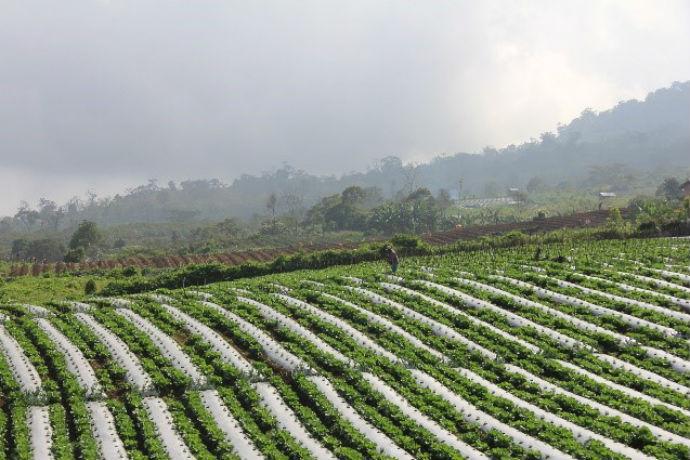Agricultural Policy Research to Support Natural Resource Management in Indonesia’s Upland Landscapes

Background
In Indonesia, there are some 48 million people in 32,000 villages living in and around forest boundaries, 10 million are categorised as poor (UNDP 2015). The majority of these households rely on upland landscapes for subsistence, livelihoods and economic development (World Bank 2015). Loss of agricultural productivity and ecosystem services leads to reduced incomes followed by increased poverty and food insecurity in a downward spiral and poverty trap. This process leads to increased deforestation as new land is brought into agriculture to make up for the lost productivity of the degraded lands. The economic impacts of not addressing Indonesia’s land degradation are significant.
An important research gap in the study of Indonesia’s upland catchments is the lack of recent analysis examining how economic policies shape farm household land use decisions. Past research focuses attention on land expansion, especially into forested areas rather than on how policies influence land management practices, production externalities and environmental outcomes on existing plots. Analysing the socioeconomic and environmental impacts from agricultural practices and communicating the policy implications to local and national decision makers is a priority research issue.
This project’s research activities provide an understanding of how existing national and local policies (e.g., public investments, property rights, extension, fertiliser and water subsidies, trade policies, and taxes) influence farm household decisions that result in these environmental externalities. The research seeks to identify how alternative policies and incentive strategies can improve economic, social and environmental outcomes.
Project objectives
The overall aim of the project is to provide advice to the Indonesian Government on policy interventions that would enhance long-term agricultural productivity, reduce negative environmental externalities and improve household welfare in Indonesia’s upland catchments. The project objectives are:
- To estimate the socioeconomic and environmental impacts of national and local policies in three upland catchments.
- To estimate the socioeconomic and environmental impacts of alternative national and local policies influence socioeconomic wellbeing and environmental outcomes in three upland catchments.
- To assess the social, economic and environmental trade-offs and distributional consequences of alternative policies compared to existing policies.
Project partners
Some of the collaborating institutions include:
- University of Adelaide, Centre for Global Food and Resources
- University of New England
- Crawford School of Public Policy, Australian National University
- Indonesian Center for Agricultural Socio Economic and Policy Studies (ICASEPS)
- The World Agroforestry Centre
- WWF Jakarta
Funding: Australian Centre for International Agricultural Research ACIAR ADP/2015/043 (2018-2021)
Contact
GFAR researchers involved in this project:
